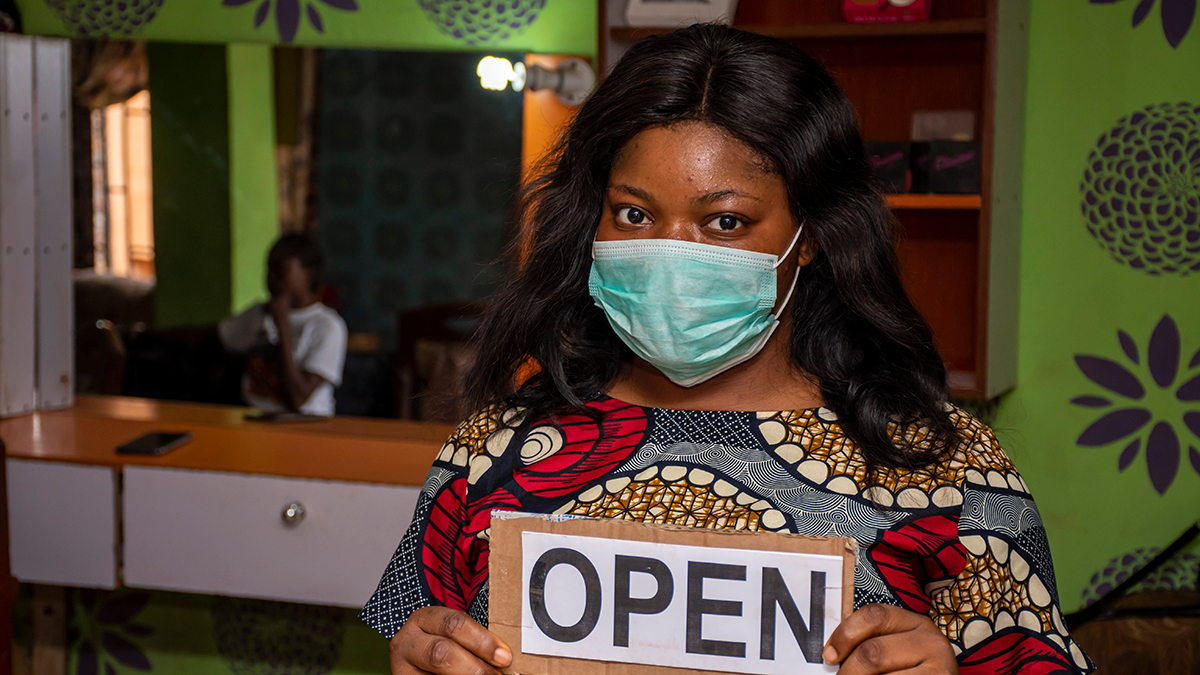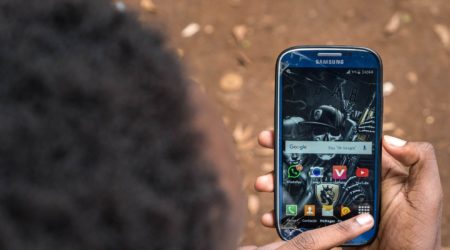Women and youth may be weathering COVID better than others, but the most vulnerable are getting left behind

As the COVID-19 crisis continues to ransack economies across developed and emerging markets, expectations are that low-income people – and the providers that serve them – will be the hardest hit. In particular, experts worry that the pandemic could push 71 million people into extreme poverty and that large portions (as many as a third) of MSMEs may shutter. As these sectors struggle, so too will the financial services providers that serve them, particularly those that depend on selling ongoing credit, advances, savings and insurance policies to these customers.
To better understand the impact of the pandemic on vulnerable families, Catalyst Fund, in collaboration with MIX, a unit at the Center for Financial Inclusion, recently polled early-stage inclusive fintech startups, and their end-users, from among the Inclusive Fintech 50 2019 winners and Catalyst Fund portfolio companies. The goal was to explore users’ experiences during the COVID-19 crisis through the lens of financial health and resilience, changes in income, and usage of financial products. For example, we asked questions about customers’ savings levels, their anxiety about repaying loans, and how useful they’ve found fintech products, in an effort to understand coping mechanisms and to provide insights for fintech startups looking to meet their needs.
Methodology
Catalyst Fund shared a web survey with selected fintech startups, each of whom shared the link with their customers to help us understand how they were faring. The startups participating in the effort included a diversity of models, from credit, to debt consolidation, to agent platforms, and therefore included customers like mobile money agents, SME owners, and consumer credit users. They represent a population of economically-active, digitally-savvy, yet underserved financial service users (low-income, remote, or otherwise excluded) who have access to the internet (90% took the survey via a smartphone).
Respondent data:
- 659 users completed the survey
- From five inclusive fintech startups
- Located in seven countries: South Africa, Ghana, Kenya, Philippines, Zambia, Rwanda, Tanzania
The post-COVID outlook for low-income customers
Many findings from our research validate the depressing picture that experts have been painting regarding the outlook for low-income people in emerging markets. In all, users of inclusive fintech startups in emerging markets have seen their incomes drop, even as their spending on essential items has increased.
Although users are taking advantage of digital financial services, they are worried about repaying their loans and lack sufficient savings and insurance coverage to help manage risk. Some overall findings include:
Users are moving to digital financial services. Whereas 66% report using a bank account prior to the pandemic, 47% report that they are using their mobile money account with greater frequency since the pandemic.
Overall, 58% have a loan outstanding, of whom 62% say they will have trouble making their loan payments. An additional 16% report they will have trouble but that the bank or the government is intervening to help.
Most respondents can cover fewer than four weeks of expenses from their savings, suggesting that many households are now living by selling assets, on credit, or have dramatically decreased their consumption.
Most users lack insurance coverage (44% have no insurance) and most likely lack other mechanisms for managing the crisis.
While many of these findings fit with those surfaced by other survey initiatives (including those from BFA Global, SPTF, the International Growth Centre, and the World Bank, helpfully contrasted by CFI) we also found that impact on income, expenses, and recovery potential has not been uniform among different segments.
Four findings stood out:
1) Seniors (>60 years old) may be significantly more economically vulnerable than working age or young people.
Segmenting the data by age, we found that young people seem best positioned to weather the pandemic, while seniors (>60 years old) may be significantly more economically vulnerable (in addition to experiencing greater health vulnerability).
To start, seniors report that their earnings have decreased significantly at rates higher than others. Whereas 53% of seniors have experienced significant decreases, only 41% of youth (younger than 30 years old) say the same. Furthermore, 35% of seniors say their spending on essential items has increased significantly, while only 17% of young people say the same.
Taken together, it may not be surprising that seniors report they will not be able to make their loan repayments at rates higher than other groups (71% of seniors, versus 58% of working age people and 67% of young people).
Seniors may be more vulnerable than other groups because they are more dependent on traditional sources of income and less able to adjust to digital ways of doing. Furthermore, firms with more older workers seem to be less able to adjust to the situation.
In contrast, youth may have found better ways of adapting by leveraging digital financial services, like digital commerce, and taking on gig work, thereby experiencing shallower dips in income than other groups. Similarly, only 40% of young people have an outstanding loan relative to 82% of seniors, suggesting they may have fewer fixed expenses and can better adjust their spending patterns.
2) Women seem to be more economically resilient than men.
Although our sample was skewed toward men (77% of respondents), female respondents were less likely to report decreased income (65%) as compared to male respondents (79%). Women were also more likely to report being able to pay their loans (29% of women say they will be able to repay whereas only 21% of men say the same). This may be because women are more likely to have unemployment and accident insurance (together, 25%) than men (11%).
This difference in level of resilience may be due to the fact that women have been better able to adjust their business models than men. Although men and women report changes in household costs in similar ways, more women (45%) report that business revenue has been sufficient to support their desired level of service, than men (33%).
This may be because more women opted to close their businesses when revenue levels dipped rather than to persist at low revenue levels. According to the survey, 39% of women business owners shut down their businesses compared to 24% of men. This suggests that women may be better able to save on costs or make the decision to temporarily shutter their business. These results are consistent with a much larger survey conducted by the World Bank which also found that women shut their businesses at higher rates.
As a result, men are more interested in seeking credit (33%) than women (only 15%), which does not bode well for their recovery since credit availability is likely to remain low. 71% of men would seek a loan from the startup in question, whereas only 53% of women say they would. Since male respondents were more likely to be the breadwinners in the household (57% of men versus 31% of women), it will likely be important for these users to get access to credit to rebuild their livelihoods and shore up their household’s resilience.
3) Users are looking to fintech startups for help and are finding their services useful.
Almost 50% of users report they have utilized the startup’s services since the onset of the pandemic, and an additional 25% have tried but were unable (these responses were largely from users of one digital credit provider). Of those that utilized the services, 60% report that the service was very useful and another 38% say the service was moderately or slightly useful.
Furthermore, these users are hopeful that the startups can continue to support them; 66% are hoping for additional loans and 32% of respondents are hoping to access savings products via the fintech startup in question. This fits with established research findings that households that have experienced large adverse shocks have higher savings rates. That said, the desire for savings was higher among those with unchanged or increased incomes than among those who had experienced decreased incomes.
4) Those who have experienced decreased incomes may be facing increasing vulnerability and exclusion – particularly when it comes to accessing credit.
In fact, the desire for additional credit is greater among those who have experienced decreased incomes (33%) than those who have seen no change or increased incomes (18%). Although these respondents are seeking more credit, they were more likely to indicate they would be unable to repay their current loans (68%) than those who reported no change or even increases in income (39%). This suggests that households who have seen depressed income (and therefore cannot pay off current loans) may be looking for credit to rebuild their livelihoods and income streams.
Discrepancies in access to funds
Unfortunately, those who have experienced decreased incomes are also more likely to have been denied (or were otherwise unable to access) services from a fintech startup (again, these denials were largely from one digital credit provider). Whereas only 13% of those with unchanged or increased incomes say they tried but were unable to use fintech services, 26% of those with decreased incomes were denied. Those with decreased incomes were also more likely (69%) to report they had tried to raise funds for their business but were unable to, compared to those who had not experienced similar dips in earnings (23%).
It is not possible to know the order of events, but it may be that access to funds (either from the fintech or from other sources) during this difficult time has helped some business owners maintain operations (and therefore avoid income dips). In contrast, those without access to finance may have been more likely to see their incomes drop. It may also be true that these same people (with lower incomes and getting turned away from credit providers) will continue to struggle to access finance going forward.
Interestingly, when asked where funds had been procured, there was no consistent answer among those with unchanged or increased income; these respondents went to family and friends, savings, banks, and other sources to access capital. However, those who experienced decreased incomes went to money lenders at much higher rates (24% versus 3%), suggesting that those under greater financial pressure may be resorting to less favorable financing options.
Furthermore, those who have experienced decreased income are less likely to have insurance coverage (46%) than those with more stable incomes (of which only 38% report having no coverage). This fits with other research findings that those who were vulnerable going into the pandemic may be slipping further into extreme poverty, and there are even fewer accessible and valuable financial options available to them.
Watch this webinar held during the Financial Inclusion Week 2020 where we discuss these findings with the innovators at Pesakit and OZÉ
…
In all, our findings suggest that inclusive fintech startups may play a central role in supporting the recovery of vulnerable households and SMEs. There is clear demand for credit and other financial products, and large gaps in insurance coverage of all kinds (i.e., health, life, disability). Startups should consider flexible ways to refinance debt, smooth incomes, and restock SMEs, while supporting consumers to slowly build back their incomes and then savings. They may find that women and youth may be better able to lead this recovery as they may have endured the pandemic under less distress than male breadwinners.
Fortunately, we are already seeing innovative fintech startups lead the way in meeting customers’ needs. Catalyst Fund has been proud to spotlight the responses of startups in our portfolio and to support them in launching innovative programs, including Sokowatch’s successful food security pilot in Kenya. MIX highlighted similar findings in a recent blog surveying the applicants of InclusiveFintech50 2020. Their research surfaced a number of creative responses that nimble and agile fintech innovators are using to stay afloat and continue serving their customers. In all, it is clear that startups are well positioned to tailor their solutions to users’ needs and could be a lifeline for many distressed consumers and small businesses during this difficult time.
If you are a fintech startup interested in surveying your users to understand how they are faring post COVID19, get in touch with our team, and we can help you find out!


